In This Episode << SLIDE LEFT TO SEE ADDITIONAL SEGMENTS
Norman Fischer on Meditation
KATE OLSON, correspondent: It’s early morning along the Pacific Coast. Norman Fischer, a Buddhist priest who’s been teaching meditation for over three decades, opens a day of silent meditation for practitioners of Zen Buddhism.
NORMAN FISCHER (speaking to group): Thank you all for coming, and I hope that everybody has a good day, a peaceful day, a day in which whatever needs to arise in your heart will do so.
OLSON: Other days, Fischer is at Google in Silicon Valley offering the same meditation practice to employees participating in a class called “Search Inside Yourself.”
FISCHER (speaking to class): Lengthen the spine, open the chest, and let your body pull itself up.
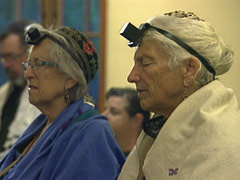 OLSON: Or he may be at a Jewish contemplative retreat sharing the practice with Jews seeking to experience their own faith tradition more deeply.
OLSON: Or he may be at a Jewish contemplative retreat sharing the practice with Jews seeking to experience their own faith tradition more deeply.
FISCHER (speaking to retreat): The practice that we’re doing on our cushions is fundamentally the practice of just feeling our life.
OLSON: The various hats that Fischer wears are part of his effort to help enrich everyday life experience by sharing the spirit and practice of Zen with the world.
FISCHER: If you really do the meditation practice and you continue that over time, your life really changes. You really have a sense of purpose, you really have a much greater sense of connection to other people, and loving kindness and interest in others and wanting to help others. Nothing makes us feel better about our own lives than that.
OLSON: At Google, Fischer is helping employees increase their so-called emotional intelligence on the job. Since the class began just over two years ago, close to 600 employees have taken it with the full blessing of management.
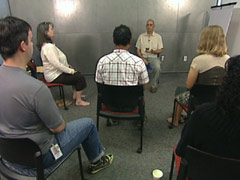 FISCHER: At Google it’s very explicit. Our brief is let’s get smarter about our feelings and emotions. Let’s go deeper than we usually go for the purpose of getting closer to ourselves and being able to be more empathetic and more understanding of others, and that’s the whole realm of emotional intelligence. There is no better technique or practice for going into and working through and really understanding our heart and the hearts of others than meditation practice.
FISCHER: At Google it’s very explicit. Our brief is let’s get smarter about our feelings and emotions. Let’s go deeper than we usually go for the purpose of getting closer to ourselves and being able to be more empathetic and more understanding of others, and that’s the whole realm of emotional intelligence. There is no better technique or practice for going into and working through and really understanding our heart and the hearts of others than meditation practice.
OLSON: Developing emotional intelligence is not a cognitive process, Fischer says. Understanding the heart calls for another way.
FISCHER: This doesn’t work by thought and will. It doesn’t disregard thought and will, but thought and will are not the engine that makes this go. The engine that makes this go is taking a step back and trusting the body, trusting the breath, trusting the heart. We’re living our lives madly trying to hold onto everything, and it looks like it might work for awhile but in the end it always fails, and it never was working, and the way to be happy, the way to be loving, the way to be free is to really be willing to let go of everything on every occasion or at least to make that effort.
So the practice really works with sitting down, returning awareness to the body, returning awareness to the breath. It usually involves sitting up straight and opening up the body and lifting the body so that the breath can be unrestrained. And then returning the mind to the present moment of being alive, which is anchored in the breath, in the body.
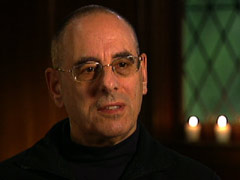 Then, of course, other things happen. You have thoughts, you have feelings. You might have a pain, an ache, visions, memories, reflections. All these things arise, but instead of applying yourself to them and getting entangled in them, you just bear witness to it, let it go, come back to the breathing and the body, and what happens is you release a whole lot of stuff in yourself. A whole new process comes into being that would not have been there if you were always fixing and choosing and doing and making. This way you’re allowing something to take place within your heart.
Then, of course, other things happen. You have thoughts, you have feelings. You might have a pain, an ache, visions, memories, reflections. All these things arise, but instead of applying yourself to them and getting entangled in them, you just bear witness to it, let it go, come back to the breathing and the body, and what happens is you release a whole lot of stuff in yourself. A whole new process comes into being that would not have been there if you were always fixing and choosing and doing and making. This way you’re allowing something to take place within your heart.
OLSON: Fischer says the meditation practice, which includes meditative walking, is not an escape from difficult or painful emotions and negative thoughts, but a way to be present, and not attached, to whatever arises. This opens a whole new way of seeing oneself and others.
FISCHER (speaking to class at Google): I begin to notice others are rather like me and I’m rather like them. There’s not so much difference, you know. I’m scared. Well, probably they are too. I have yearnings or longings. Well, maybe they do too. So maybe there’s more of a felt sense, not a theoretical sense, but a felt sense of actual kinship.
OLSON: And this has implications that go beyond working more effectively for a company.
FISCHER: You end up coming to a place where it becomes more and more difficult to be harmful to others. It becomes more and more difficult not to be kind, more and more difficult to push for a result and not notice the consequences.
OLSON: At the Jewish retreat, Fischer teaches meditation to help Jews experience their own faith more deeply. He draws on traditional Jewish language and imagery in his teaching, such as Jacob’s ladder.
FISCHER (speaking to retreat group): A ladder rooted in the earth and stretching up toward heaven—that’s the human body. That’s the spine is that ladder.
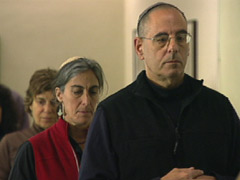 OLSON: Fischer, who is a practicing Jew, feels much of the teaching about Judaism today doesn’t do enough to support a personal connection with God. Meditation not only deepens this relationship but helps one see God in everything, as he says the Torah teaches.
OLSON: Fischer, who is a practicing Jew, feels much of the teaching about Judaism today doesn’t do enough to support a personal connection with God. Meditation not only deepens this relationship but helps one see God in everything, as he says the Torah teaches.
FISCHER: When we sit we recognize the crucial, divine importance of absolutely everything that arises—every thought, every feeling, every breath, every unspeakable, unnameable impulse. But also we recognize the ultimate importance of the others—of the sky, of all the sounds inside and outside the room. As the mind becomes a little more quiet the sacredness of everything within and without becomes clear to us.
OLSON: So how can a practice from Zen Buddhism, a tradition that does not speak of God, help practitioners from a tradition where God is central?
FISCHER: Buddhism in general is not committed to God or no God. It’s committed to awakening. So taking this practice from Buddhism and applying it to Judaism, it’s a way to go deeper into our heart, our mind, our consciousness and in a Jewish context, when you do that I think, at the bottom, you find the divine. You find God, and there’s nothing in this practice nor is there anything in Buddhist or Zen thought that would deny this possibility.
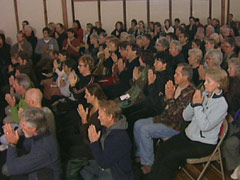 OLSON: Fischer, who has served as abbot of the San Francisco Zen Center, says it’s important on the spiritual journey not to ignore the emotional realm, which is sometimes overlooked in religious practice.
OLSON: Fischer, who has served as abbot of the San Francisco Zen Center, says it’s important on the spiritual journey not to ignore the emotional realm, which is sometimes overlooked in religious practice.
FISCHER: When we think we’re going to go from, you know, everyday life straight through to the divine, leaving out maybe all the many needs and feelings and human foibles and frailties that are actually there, they need to be processed and dealt with.
(speaking to retreat group): The thing about this practice that is, to me anyway, so sweet is that we are doing it together. We’re walking the big long line all together, like one person walking.
OLSON: Wherever Fischer teaches, he says the practice is an ongoing contemplation that leads beyond the self to a deep connection and compassion for others and all life.
FISCHER: And if you stay with this practice long enough, you basically will work through all the knots and confusions that your life has sort of set up within you. The practice will help you work through that and see below, below, below, below all of that to the place where you see what’s really important to you, and what really matters to you is that you are alive, and you are alive in a world with others. You really feel like my life is a life of complete connection, and it’s a life of joyful connection and concerned connection, and then you have to act on that.
OLSON: Fischer says the practice he teaches doesn’t conflict with other faith traditions, but can be helpful to anyone on the spiritual journey, a journey he calls “to the bottom of the heart.”
For Religion & Ethics NewsWeekly, this is Kate Olson in San Francisco.

